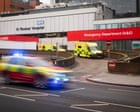
In a moment characterized by both challenges and breakthroughs, the UK healthcare system stands at a crossroads marked by a pressing demand for organ transplants and innovative strides in early cancer detection. This harmonious balance of urgent needs and promising solutions paints a complex yet hopeful picture of the national health landscape.
According to recent figures from NHS Blood and Transplant (NHSBT), the number of individuals awaiting lifesaving organ transplants in the UK has reached a record high. Currently, over 8,000 people, including nearly 300 children, are waiting for transplants that are critical to their survival. Additionally, there are approximately 4,000 other patients who remain in a precarious state, either too unwell to undergo surgery or temporarily unavailable for such procedures. The total estimate of those living in this tentative balance is close to 12,000, capturing the urgency of the situation. This increase in demand comes amid a noticeable decline in the number of donors, underscoring the need for awareness and action to address this disparity effectively.
Simultaneously, new initiatives are paving the way for early intervention in cancer detection. In a pioneering move, NHS pharmacies across England have introduced a pilot scheme deploying a novel ‘sponge on a string’ test. This test is designed to detect precursors to oesophageal cancer—a cancer particularly known for its severity. The process involves a tablet-sized capsule that expands once it reaches the stomach, promising an innovative and non-invasive method to assess individuals suffering from persistent heartburn or acid reflux. This initiative forms part of the government’s comprehensive 10-year health plan, emphasizing early detection as a critical component in improving overall survival rates and health outcomes.
While advancements in medical technologies continue to offer hope, broader societal measures are also being scrutinized. As an example of this, the government on another note has declared a policy to prohibit smartphones in schools up to the sixth year, acting on concerns regarding their potentially disruptive effects on child development. This measure brings into focus discussions about the balance between technology’s benefits and its possible downsides in educational settings, highlighting ongoing debates in child development and education policy.
In summary, the current state of healthcare in the UK encapsulates a nuanced picture of urgent demands alongside meaningful strides forward. As the nation grapples with the record high waiting lists for organ transplants, it simultaneously embraces innovative technological solutions keenly aligned with improving health outcomes. Furthermore, socioeconomic measures such as the smartphone ban in early schooling reflect an informed consideration of holistic well-being in the context of growing digital influences. Together, these developments illustrate a concerted effort towards nurturing a more resilient and responsive healthcare system, while advocating proactive societal norms that promote overall well-being in the changing world.
Source: {link}
